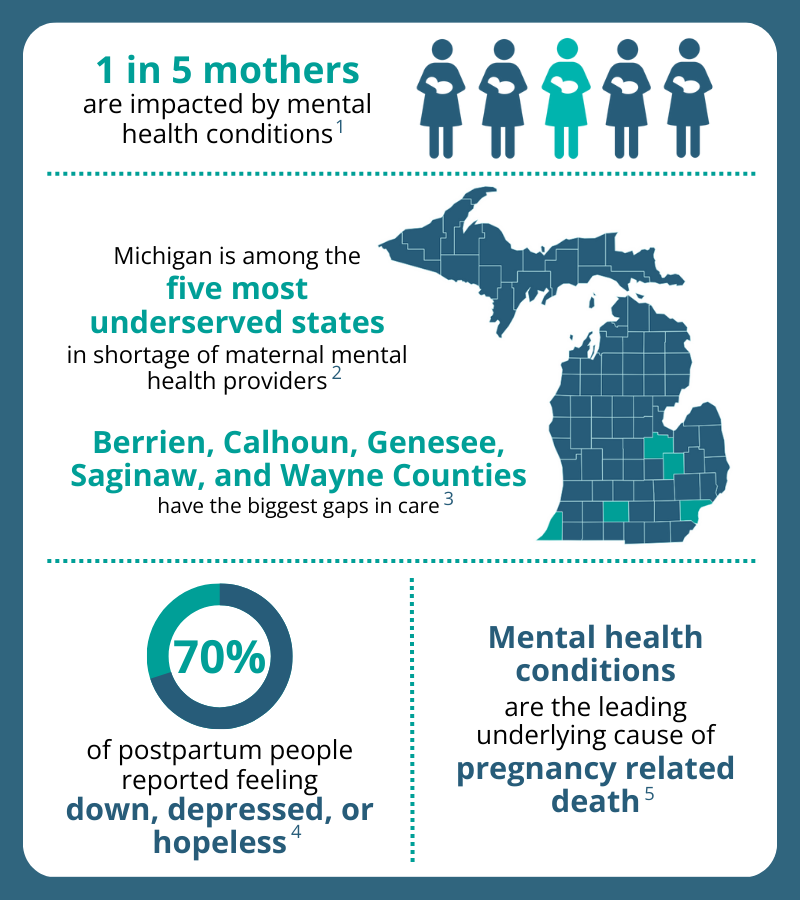
Child & Adolescent Psychiatrists (CAPs) are integral to the improvement of our mental health crisis as they specialize in the diagnosis and treatment of behavioral and mental health disorders affecting youth. However, there is a severe shortage of CAPs both nationally and in the state of Michigan.
MC3 works to expand the reach of this specialized psychiatry by educating health care providers in Michigan on how to identify, treat, and manage behavioral and mental health concerns among youth. This is accomplished through MC3’s direct psychiatry consultations to discuss complex patients, educational trainings on behavioral/mental health topics, and digital library of free resources tailored to health care providers, including Psychopharmacology Reference Cards and Pediatric Resource Library.
The importance of mental health among perinatal people cannot be overstated. In addition to affecting the life of the pregnant person, research has demonstrated the presence of perinatal mental health disorders have been shown to increase the risk for psychological and developmental concerns in their children.
As a Perinatal Psychiatry Access Program (PPAP), MC3 ensures providers are equipped to support the needs of perinatal patients by educating front-line providers on the diagnosis and treatment of perinatal mental health conditions, consulting with providers on complex cases, and referring providers to local resources for support. Additionally, MC3 directly supports perinatal people through our infant mental health informed Perinatal Patient Care services, offered in select counties.

Infographic 1: 1) Flores MW, Sharp Am, Carson NJ, Cook BL. Estimates of Major Depressive Disorder and treatment among adolescents by race and ethnicity. JAMA Pediatr. 2023; 177(11):1215-23. https://doi.org/10.1001/jamapediatrics.2023.3996; 2) Trost SL, Beauregard J, Njie F, et al. Pregnancy-Related Deaths: Data from Maternal Mortality Review Committees in 36 US States, 2017–2019. Atlanta, GA: Centers for Disease Control and Prevention, US Department of Health and Human Services; 2022.
Infographic 2: 1) National Survey of Children’s Health: Adolescent Mental and Behavioral Health. Health Resources and Services Administration. October 2024. 2) American Academy of Child and Adolescent Psychiatrists. Workforce Maps by State. www.aacap.org. 2024. 3) Flores MW, Sharp Am, Carson NJ, Cook BL. Estimates of Major Depressive Disorder and treatment among adolescents by race and ethnicity. JAMA Pediatr. 2023.
Infographic 3: 1) James D. Perinatal Psychiatry Access Programs are Addressing the Gap in Maternal Mental Health Care — Maternal Mental Health Leadership Alliance: MMHLA. Maternal Mental Health Leadership Alliance: MMHLA. https://www.mmhla.org/articles/perinatal-psychiatry-access-programsnbsp-closing-the-gap-in-maternal-mental-health-care. September 13, 2024. 2) Burkhard, J., Murphy C., Childers, A. Maternal Mental Health Dark Zones- Counties with the Highest Risk and Lowest Resources Revealed. Policy Center for Maternal Mental Health. https://www.2020mom.org/us-maternal-mental-health-dark-zones-revealed. November 2023. 3) High risk/lowest Resource County List. Policy Center for Maternal Mental Health. https://policycentermmh.org/high-risk-lowest-resource-county-list/. November 2023. 4) PRAMS reports. https://www.michigan.gov/mdhhs/adult-child-serv/childrenfamilies/prams/reports. 2022. 5) Trost SL, Beauregard J, Njie F, et al. Pregnancy-Related Deaths: Data from Maternal Mortality Review Committees in 36 U.S. States, 2017-2019. CDC, US Dept of Health and Human Services. 2022.